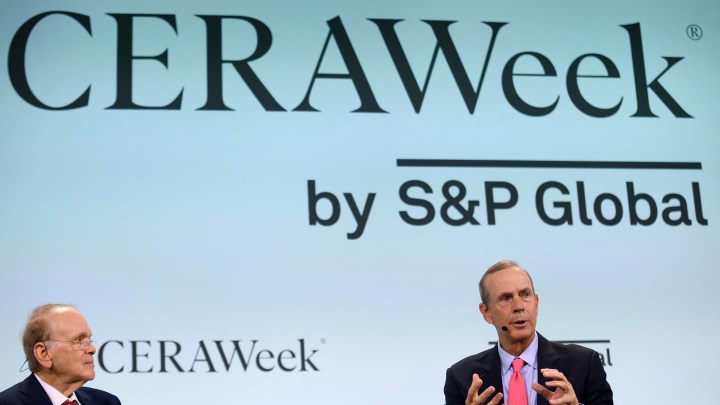
Takeaways from one of the world’s biggest energy summits

One of the world’s biggest energy conferences, CERAWeek, comes to a close today. All this week, global oil and other energy executives, government officials and more have been meeting in Houston at what’s been dubbed the “Super Bowl” of energy.
Vijay Vaitheeswaran is Global Energy and Climate innovation editor for The Economist magazine. He’s been in Houston covering the conference, and his latest reporting from the event, a piece titled “For 50 years the story of oil has been one of matching supply with increasing demand,” is available now.
Vaitheeswaran spoke with “Marketplace Morning Report” host Sabri Ben-Achour about highlights from the week. The following is an edited transcript of their conversation.
Sabri Ben-Achour: What’s everyone talking about? What are the hot topics?
Vijay Vaitheeswaran: So it’s interesting: The mood is very sour this year amongst the oilmen. Under the Biden administration’s watch, oil and gas production has grown dramatically, in part because the U.S. has encouraged it. The Biden team has encouraged this, because of the war in Ukraine, the crackdown on Russia, the energy crisis in Europe. And so the oil industry was relatively happy. This year, the mood is very different, quite sour.
Ben-Achour: Is that because the Biden administration put a temporary pause on liquefied natural gas exports to certain countries?
Vaitheeswaran: Well, you put your finger on it. There are a couple of reasons why. One is very much to do with some of the election-year decisions that the administration has taken. One is the pause on LNG export approvals. But there are other decisions, too. There’s a decision, very technical tax ruling concerning the way that hydrogen is made. There’s a new ruling this week concerning tailpipe emissions that’s really about encouraging electric vehicles.
They’ve seen a series of decisions that from their point of view is hostile to the industry. But there’s another reason, a deeper reason. That is that the money that was supposed to flow from the bipartisan infrastructure law as well as the [Inflation Reduction Act] climate law has been a bit slow-coming. Santa Claus came last year. This year, the goody bag looks a little empty. And there also seems to be a stick that Santa Claus is wielding. And so, as you could imagine, the oilmen are throwing a tantrum.
Ben-Achour: Are there any telling dividing lines that you see on display at this conference?
Vaitheeswaran: Really the ghost at the banquet at this event was Donald Trump. People are very, very mindful that there’s an election year, this is a split country. And they believe that the agenda on environment will lead to a lot of rollbacks. Now to be clear, the IRA law, the signature accomplishment of the Biden administration on climate, is not expected to be rolled back. And I spoke with a lot of lobbyists for the energy industry. They don’t want it rolled back, because it provides many, many billions of dollars, really hundreds of billions of dollars, including green energy. A number of them are actually investing in some of these renewable plants that are going to get very lucrative credits.
Ben-Achour: When this conference, when CERAweek ends, what do you think the main thrust will be? What are some outcomes that might have an impact on the industry’s future?
Vaitheeswaran: You have to go back to trace the arc to Dubai, where the world climate conference, the UN COP28, took place just in November, where there was a huge momentum to phase out fossil fuels, right? There was an international agreement. Here is the counterpoint in the rebuttal from Houston, the energy and oil capital of the world, and that is, not so fast. The chairman of Aramco, the Saudi oil company, gave a very aggressive speech at the start of the conference saying, “Here are some hard truths about energy: 80% of the world’s energy still comes from fossil fuels. And oil is here to stay, and we’re here to stay.”
There’s a lot happening in the world. Through it all, Marketplace is here for you.
You rely on Marketplace to break down the world’s events and tell you how it affects you in a fact-based, approachable way. We rely on your financial support to keep making that possible.
Your donation today powers the independent journalism that you rely on. For just $5/month, you can help sustain Marketplace so we can keep reporting on the things that matter to you.

















